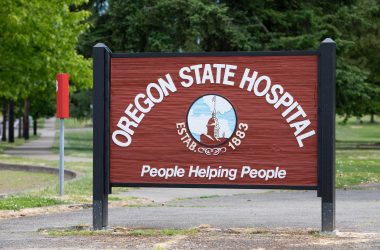Medicaid insurers have agreed to pay a total of $25 million from their profits to help fund behavioral health projects focused on youth, Gov. Tina Kotek announced on Thursday.
Kotek had asked Oregon’s 16 regionally based Medicaid insurers – also called coordinated care organizations – to reinvest $25 million of their profits into community projects in part because of record amounts the organizations reaped during the COVID-19 pandemic. Medicaid insurers are paid taxpayer dollars from the state and federal government to pay for health and dental care for about 1.45 million people on the Oregon Health Plan, which serves low-income Oregonians. The insurers are allowed to pocket any surplus money after they’ve met their obligations as profits.
After Kotek’s request, the coordinated care organizations decided to put a one-time allotment toward four projects across the state to help address the gaps in behavioral health care coverage. The coordinated care organizations, their providers and Oregon Health Authority all signed an agreement on Thursday, the governor’s office said.
“Oregon needs more treatment options to help young people in our state who are struggling with serious behavioral health issues,” Kotek said. “The state and CCOs developed a plan to reinvest surplus Medicaid dollars into Oregon communities, and this partnership will support youth behavioral health projects that we desperately need.”
The money will help providers across the state add dozens of beds to projects, some of them already underway. In total, the money will help fund more than 100 new beds in youth facilities across Oregon, public records of the agreements obtained by the Capital Chronicle show.
For example, $7.5 million will go toward a project based in Douglas County through Adapt Integrated Health Care, a southern Oregon provider. The campus project, already underway on 40 acres east of Roseburg, will more than triple its capacity from 40 beds to about 118 beds.
“Adapt has developed plans for a Recovery Campus and with the generous support of the CCOs, under Governor Kotek’s leadership, we now have the funding to move forward on construction,” Dr. Greg Brigham, CEO of Adapt Integrated Health Care, said in a statement.
He said the funding will help the project replace antiquated facilities and grow.
“This resource will result in access to life saving care for those who need it, when they need it.”
There are three other projects across the state that will receive funding to add psychiatric residential treatment beds for youth.
They are:
- $13.2 million to the Trillium Family Services for expansion in the Portland metro area. Trillium asked for the money to help build a 12-bedroom facility in Portland for youth.
- $2.3 million for a project overseen by Looking Glass Community Services in Lane County to expand capacity. The money will allow Looking Glass to hire staff necessary to open four more beds in its existing Eugene facility, records show. The beds are already built and ready for patients, the proposal says.
- $2 million to Community Counseling Solutions, an eastern Oregon provider that serves Morrow, Grant, Gilliam, Wheeler and Umatilla counties. The organization wants to open and operate a secure residential facility that will treat and house up to 14 children ages 6 to 11, its proposal says. The facility will be located in Morrow County.
In a statement, Behavioral Health Director Ebony Clarke said the work will help address statewide challenges.
“These investments will help spur and close projects that will propel the state forward in closing key program gaps that have been exacerbated by fentanyl in recent years,” Clarke said. “I look forward to this partnership making a real difference in Oregon communities.”
Eastern Oregon Coordinated Care Organization CEO Sean Jessup said in a statement they came together collectively for the “benefit of all members.”
Oregon Capital Chronicle is part of States Newsroom, a network of news bureaus supported by grants and a coalition of donors as a 501c(3) public charity. Oregon Capital Chronicle maintains editorial independence. Contact Editor Lynne Terry for questions: [email protected]. Follow Oregon Capital Chronicle on Facebook and Twitter.
STORY TIP OR IDEA? Send an email to Salem Reporter’s news team: [email protected].

Ben Botkin - Oregon Capital Chronicle
Ben Botkin covers justice, health and social services issues for the Oregon Capital Chronicle. He has been a reporter since 2003, when he drove from his Midwest locale to Idaho for his first journalism job. He has written extensively about politics and state agencies in Idaho, Nevada and Oregon. Most recently, he covered health care and the Oregon Legislature for The Lund Report. Botkin has won multiple journalism awards for his investigative and enterprise reporting, including on education, state budgets and criminal justice.









